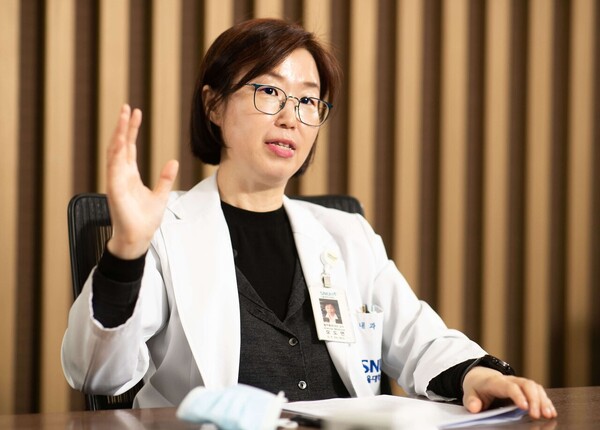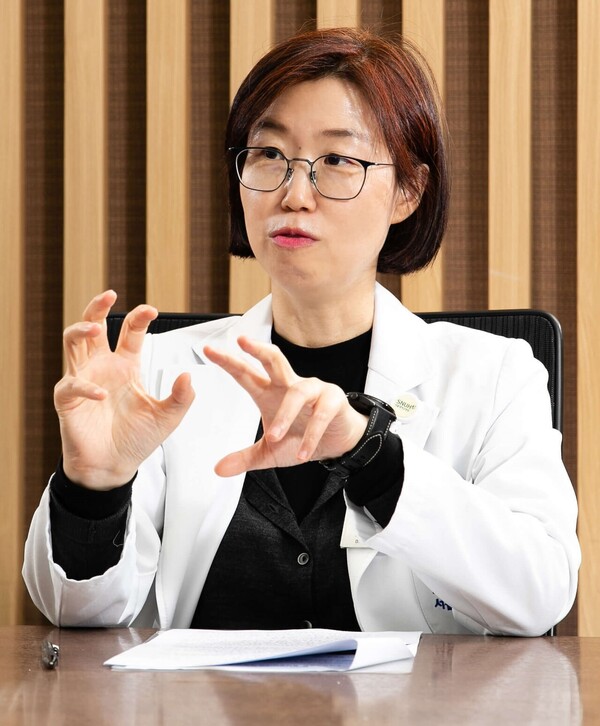HER2-negative gastric cancer, which accounts for about 80 percent of progressive stomach cancers, has been a barren area for developing new drugs over the past two decades.
In June 2021, the first immunotherapy, Opdivo (nivolumab), won approval from the Ministry of Food and Drug Safety, opening the way for changes in the treatment of gastric cancer. This field had been stagnant due to its reliance on chemotherapy.
Opdivo has become a new standard of care in combination with existing cytotoxic anti-cancer drugs, demonstrating significant improvements in patient survival. However, it has not received reimbursement in Korea since it got the nod from the ministry.
Fortunately, Opdivo passed the Health Insurance Review and Assessment Service’s Drug Benefits Evaluation Committee this month, leaving only drug price negotiations with the National Health Insurance Service. However, even if the negotiations go smoothly, the validity of the companion diagnosis cost revision and reimbursement criteria will be a new task to be solved.
Against this backdrop, Korea Biomedical Review met with Professor Oh Do-youn of the Department of Hemato-Oncology at Seoul National University Hospital to discuss the implications of Opdivo’s emergence in the first-line treatment of advanced gastric cancer and what remains to be done to improve Korean patients' access to the new standard treatment.

Question: A new drug has appeared in the primary treatment of advanced HER2-negative gastric cancer in nearly 20 years.
Answer: Generally, the first-line treatment for gastric cancer is divided into two categories: HER2-positive and negative. In the past, both HER2-positive and negative patients had no options other than cytotoxic chemotherapy. Still, introducing trastuzumab as a new drug for HER2-positive gastric cancer in 2010 completely changed the treatment paradigm. For HER2-negative gastric cancer, however, there had been no new drugs for a long time, leaving patients with no viable options other than conventional cytotoxic chemotherapy.
Opdivo was the first agent to demonstrate that immunotherapy to conventional cytotoxic chemotherapy can significantly improve survival and prognosis for people with HER2-negative gastric cancer. The CheckMate-649 study, Opdivo’s clinical trial to win approval, was a milestone in treating HER2-negative gastric cancer and has served as a benchmark for the next generation of treatments.
Q: Patients with PD-L1 CPS 5 or higher are eligible for Opdivo with reimbursement. How many HER2-negative patients belong to that category?
A: Specific patient sizes may vary by experts, but I believe about 20-40 percent of HER2-negative gastric cancer patients are eligible for PD-L1 CPS of 5 or higher (subject to a combination of Opdivo + chemotherapy). Other patients can only receive the combination of Opdivo + chemotherapy on a non-reimbursement basis, so the cost burden is high. However, as the combined Opdivo therapy demonstrated a significant clinical effect regardless of PD-L1 expression in the CheckMate-649 study and won approval for all-comers in Korea, it will be difficult for patients or their guardians to accept that they will not be eligible for benefits only because they show PD-L1 CPS less than 5.
Q: We wonder if the biomarker “PD-L1” in gastric cancer treatment is an appropriate assessment tool to select candidates for treatment with immunotherapies.
A: Immunotherapies have been used to treat various cancers, not just gastric cancer, and higher PD-L1 (Programmed Death-Ligand 1) expression tends to be associated with higher therapeutic benefits. In the CheckMate-649 study, the higher the PD-L1 CPS, the more favorable the hazard ratio (HR). However, “PD-L1 CPS 5” is an arbitrary cutoff value established in clinical studies and is not an absolute value that determines the effectiveness of Opdivo in combination therapy.
Q: There is also the issue of companion diagnostics. Should PD-L1 expression be tested only with the IHC 28-8 pharmDx kit to screen patients eligible for Opdivo reimbursement?
A: It depends on the regulator’s position and reimbursement standards. If the government dictates that only the IHC 28-8 pharmDx used in the CheckMate-649 study should be used for testing, medical institutions must follow the guidelines. However, as someone who has been using and prescribing immunotherapies for a long time in clinical practice, I think it would be reasonable to introduce more flexible standards for PD-L1 expression rate testing methods and processes.
Q: In the first-line treatment of gastric cancer, Opdivo has different approval and reimbursement criteria, requiring a revision of the diagnosis fee. We have heard of cases of confusion in the clinic due to the timing of the actual drug reimbursement and the revision of the diagnosis fee.
A: In clinical fields, it will take considerable time to explain to each patient and guardian that, contrary to the approval, only patients with PD-L1 CPS 5 or higher are eligible for reimbursement for Opdivo combination therapy and that they would need to understand and make an informed decision fully. Add to that the inevitable delays in diagnosis and treatment due to administrative bureaucracy, and you have a recipe for confusion. The last thing you want is confusion in the clinical setting.

Q: Recently, other immunotherapies with similar mechanisms to Opdivo have also demonstrated improved survival in the first-line treatment of gastric cancer. How do you foresee the role of immunotherapies in treating gastric cancer?
A: It is often said that today’s clinical research is the standard treatment four to five years later. Combining immunotherapies and chemotherapies has become the standard for first-line treatment of HER2-negative gastric cancer. Many studies are also going on to evaluate treatment strategies by adding targeted agents to this backbone.
Q: If combined immunotherapies have been standardized enough to become the “backbone” of future research, we think there will be a lot of problems with the reimbursement restrictions for Opdivo being discussed. Is there any other room for improvement?
A: If I mention only one of them, the reimbursement period of immunotherapies, including Opdivo, is limited to two years. This means that even if they get insurance benefits after a lengthy process, patients must return to unreimbursed treatment after two years. I hope this system will also be improved to ensure that more patients with gastric cancer have full access to immunotherapy treatment.

